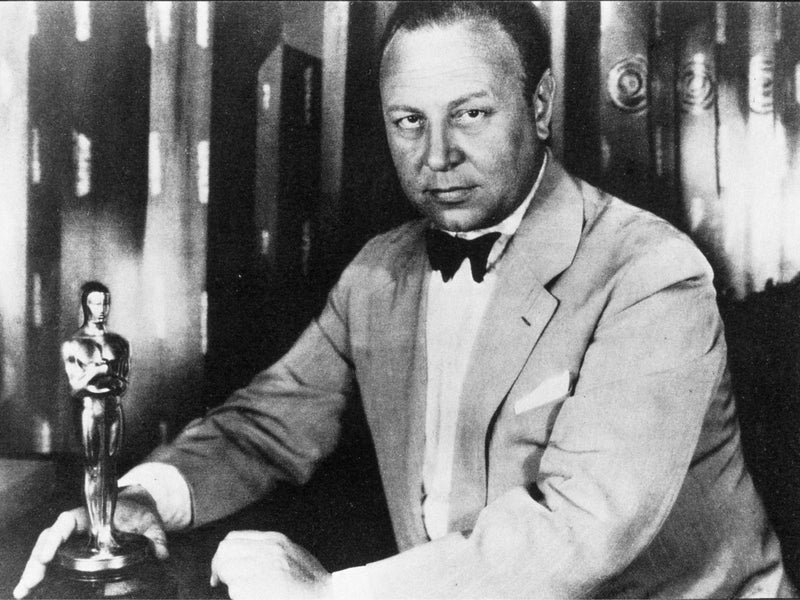Martin Chilton delves into the hidden history of the very first Academy Awards. When the ballot results came in to decide the first winner of the Oscar for Best Actor, the Academy of Motion Picture Arts and Sciences realised they faced a tricky problem. The “actor” who had collected the most votes was actually a dog called Rin-Tin-Tin, who had starred as Rinty in popular films such as A Dog of the Regiment and Jaws of Steel. The film board were concerned that awarding the first statuette to a canine would hardly give credibility to their new awards. To avoiding appearing to be barking mad, they diverted the 1929 Oscar to Emil Jannings.
![[Emil Jannings and Evelyn Brent in the Josef Von Sternberg's 'The Last Command']](https://static.independent.co.uk/s3fs-public/thumbnails/image/2019/02/01/14/last-command.jpg)
The academy awarded some honours in their inaugural year for performances in more than one film. Jannings won for his portrayal of both a bank clerk in 1927’s The Way of All Flesh, and for playing Grand Duke Sergius Alexander in the 1928 film The Last Command. Looked at through the long lens of history, the decision backfired. A committee who were so worried about the embarrassment of honouring a dog ended up commemorating a man whose career ended in ignominy as a reviled propagandist for Adolf Hitler. The Oscars snubbed a German shepherd and got a Nazi poodle instead.
![[A portrait of Emil Jannings, circa 1930]](https://static.independent.co.uk/s3fs-public/thumbnails/image/2019/02/01/14/emil-jannings.jpg)
At the end of the Second World War, with Hitler and his minister of propaganda Joseph Goebbels dead, Jannings is said to have rushed towards the allied troops marching into Berlin, clutching his golden statuette and yelling: “Don’t shoot, I have won an Oscar!” He was not imprisoned, but his reputation was in tatters. The man once considered the world’s greatest actor never worked again. Ninety years on from that historic award, it’s no surprise that the academy don’t talk much about their first Best Actor winner.
The strange story of Jannings began in Rorschach, Switzerland, with his birth on 23 July 1884. His father Emil, a well-to-do American businessman from St Louis, died when the future actor was a child. His mother, Margarethe, moved the boy, who was christened Theodor Friedrich Emil Janenz, to Görlitz, in the far east of Germany. Jannings ran away from home at 16 to become a sailor, but quickly decided that he wanted to be an actor. His first break came when he joined Max Reinhardt’s theatre company in Berlin in 1906. He landed his first film role in 1918 when, using the name Emil Jannings, he starred in Die Augen de Mumie Ma (The Eyes of the Mummy). He quickly established himself as one of the talents of the German silent film industry, starring in acclaimed films such as Othello (1922), The Last Laugh (1924) – which Alfred Hitchcock described as “almost the perfect film” – and Variety (1925).
His work attracted the attention of Hollywood and, in 1927, he was lured to America with a lucrative contract from Paramount Pictures. Paramount gave him extraordinary control over scripts, roles and choice of directors. In the next two years, he made six silent films in America, including Betrayal with Gary Cooper. Betrayal, along with The Patriot and Street of Sin, is considered lost forever. He was popular with American movie fans, and he sought to overcome any doubts about his place in American society by dissembling, telling the press he was born in Brooklyn.
Jannings fitted in with the social whirl of Hollywood – there are pictures of him sitting with a swimsuit-wearing Greta Garbo – but to some of the actors with whom he worked closely, he was a moody despot. German-born Fritz Feld, who appeared in 140 films including Hello, Dolly! and Herbie Rides Again, told film writer Michael Dobbs that during the making of The Last Command Jannings took him aside and said he wanted to sack director Josef von Sternberg and put Fritz in his place. Fritz declined to behave treacherously and Jannings screamed “You fool! You god-damn fool!” at him.
When The Last Command was made, Jannings was 44 and carried the baggage of three short-lived marriages that had ended in divorce. He was estranged from his two children. Although he wed again, to a former Berlin cabaret performer and actress called Auguste Maria Holl (who was always known as “Gussy’), it didn’t stop him from making advances towards other actresses. Evelyn Brent played William Powell’s love interest in The Last Command. In her biography, The Life and Films of Hollywood’s Lady Crook, she recalls that after being snubbed, Jannings went round telling the film crew that Brent “wasn’t his type”. When she heard about his slurs, the 32-year-old, who had been appearing in films since 1917, confronted him. When he asked why she was not interested in a love affair, she replied coolly, “because you’re 10 years too old and 40 pounds too fat”.






















